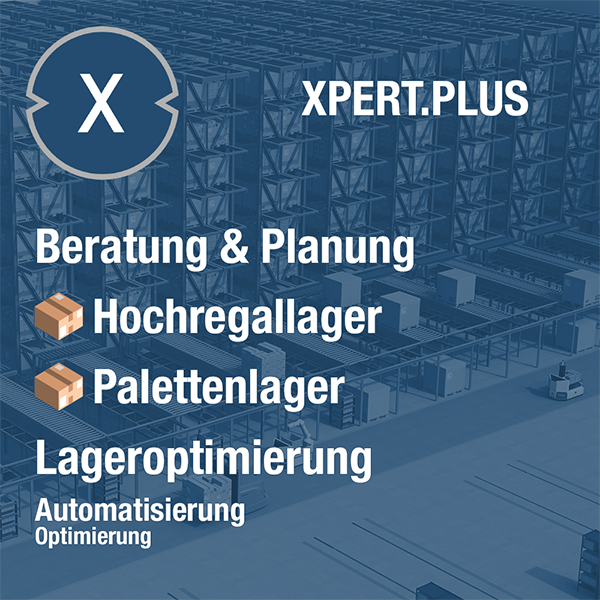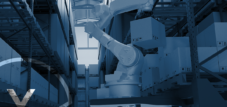Logistics 4.0: Smart Logistics Backbone
Xpert pre-release
Language selection 📢
Published on: August 31, 2025 / Updated on: August 31, 2025 – Author: Konrad Wolfenstein
From Package to Brain: How AI and IoT are Changing Our Supply Chains Forever
The intelligent backbone system for modern logistics infrastructures
The Smart Logistics Backbone represents a fundamental revolution in the way modern logistics systems are designed, developed, and operated. As an intelligent backbone system, it forms the central nervous system of a highly integrated, data-driven, and adaptive logistics landscape that can serve both civil and specialized application areas.
Basics and definition of the Smart Logistics Backbone
A Smart Logistics Backbone is a comprehensive, technologically integrated system that serves as the fundamental infrastructure for modern logistics operations. It combines physical infrastructure such as terminals, transport routes, and transshipment points with digital technologies into a unified, intelligent network. This fusion creates a dynamic system capable of optimizing and coordinating goods flows, information flows, and operational processes in real time.
The concept is based on the recognition that traditional logistics systems are often fragmented and reactive. The Smart Logistics Backbone, on the other hand, enables proactive, predictive management through the integration of various technology layers. This architecture creates a cohesive ecosystem in which all supply chain actors can communicate and interact seamlessly.
Technological pillars of the intelligent logistics system
Internet of Things as a sensory network
The Internet of Things forms the sensory nervous system of the Smart Logistics backbone. IoT sensors are strategically placed on vehicles, containers, storage systems, and infrastructure elements to continuously collect data on location, condition, temperature, humidity, and other critical parameters. These sensors create unprecedented transparency along the entire supply chain, enabling logistics managers to have a complete overview of their operations at all times.
The collected data flows in real time into central processing systems, where it is analyzed and prepared for operational decisions. This continuous data collection enables early detection of problems, prediction of maintenance needs, and identification of optimization potential before they impact service quality.
Artificial intelligence as an intelligent brain
Artificial intelligence acts as the intelligent brain of the smart logistics backbone, processing the enormous amounts of data generated by IoT sensors and other sources. AI algorithms analyze historical data, recognize patterns, and make accurate predictions for future developments. These capabilities enable logistics companies to shift from reactive to proactive operating models.
Machine learning systems continuously optimize route planning, inventory management, and resource allocation. They can analyze traffic patterns, consider weather conditions, and even incorporate unforeseen events into their calculations to always find the most efficient solutions. This intelligent control leads to significant cost savings and efficiency improvements.
Big Data Analytics for Strategic Insights
Big data analytics forms the analytical backbone of the smart logistics backbone, enabling strategically valuable insights to be extracted from the vast amounts of data. Modern analytics systems can detect complex relationships between different variables, helping to identify long-term trends and adapt business strategies accordingly.
These analytical capabilities not only support operational decisions but also enable strategic planning at the highest level. Companies can anticipate market developments, optimize capacity planning, and identify new business opportunities before they become apparent.
Digital twins as virtual images
Digital twins represent highly detailed, dynamic virtual representations of physical logistics systems. These virtual models are continuously synchronized with real-time data from the physical world, enabling complex operational scenarios to be simulated without impacting real-world operations. Logistics managers can test various strategies, identify bottlenecks, and implement optimizations before implementing them in reality.
This technology is particularly valuable for predictive maintenance and strategic planning. By simulating various scenarios, companies can understand the impact of decisions, minimizing risks and maximizing opportunities.
Physical infrastructure as intelligent hubs
The Smart Logistics Backbone transforms traditional logistics infrastructures into intelligent hubs known as Smart Logistics Nodes. These intelligent nodes integrate advanced technologies directly into the physical infrastructure, transforming ports, terminals, warehouses, and transshipment points into active participants in the logistics network.
Smart Logistics Nodes feature automated handling systems, intelligent warehouse management, and adaptive capacity control. They can communicate autonomously with other nodes, optimize resources, and dynamically adapt to changing demands. This infrastructure-level intelligence creates a self-optimizing network that continuously improves its performance.
Automation and robotic systems
Automation forms a central building block of the smart logistics backbone and encompasses a wide range of robotic systems. Driverless transport systems move goods autonomously through warehouse and handling areas, while collaborative robots assist humans with complex tasks. This automation not only reduces labor costs but also increases the precision and speed of logistics operations.
Modern sorting and picking systems operate around the clock with the highest precision and can adapt flexibly to changing requirements. The integration of AI enables these systems to continuously learn and optimize their performance.
Cloud computing as an integrative platform
Cloud computing platforms act as the integrative backbone of the Smart Logistics Backbone, enabling the seamless connection of all system components. These cloud-based systems provide the necessary scalability and flexibility to keep pace with the dynamic demands of modern logistics operations.
Cloud platforms enable different supply chain actors to access common data sets and collaborate in real time. This shared visibility creates transparency and enables coordinated decisions that optimize the entire network.
Future-proof logistics solutions: The adaptive backbone of modern infrastructures
Application in various areas
Civil logistics applications
In civilian applications, the Smart Logistics Backbone is revolutionizing traditional supply chains through the introduction of intelligent, adaptive systems. E-commerce companies are leveraging these technologies to achieve ultrafast delivery times while simultaneously optimizing costs. Precise forecasting of demand patterns makes it possible to minimize inventory levels while still ensuring high availability.
Multimodal transport systems particularly benefit from the intelligent coordination of different modes of transport. The Smart Logistics Backbone can seamlessly link rail, road, and water transport, optimally leveraging the strengths of each mode.
Special application areas and dual-use concepts
The Smart Logistics Backbone offers significant potential for specialized applications that enable both civilian and other uses. This dual-use capability creates synergies between different user groups and maximizes the efficiency of the infrastructure.
Sharing infrastructure and systems makes it possible to optimize investments while achieving higher utilization rates. Intelligent prioritization systems can prioritize critical transports when needed without significantly impacting normal use.
Interoperability and standardization
A crucial aspect of the Smart Logistics Backbone is ensuring interoperability between different systems and actors. Standardized interfaces and protocols enable components from different manufacturers to work together seamlessly. This standardization is particularly important in international supply chains, where different technical standards and regulations converge.
The development of common data formats and communication protocols creates the basis for a truly integrated logistics network in which information can flow freely and all actors operate on the same data basis.
Cyber security and data protection
The increasing digitalization and interconnectedness of the smart logistics backbone brings with it new challenges regarding cybersecurity and data protection. Robust security architectures must be implemented to protect sensitive data and ensure system integrity.
Blockchain technologies can help create trusted and transparent data flows, while modern encryption methods ensure the security of critical communications. The implementation of zero-trust architectures ensures that only authorized actors have access to relevant system components.
Sustainability and environmentally friendly logistics
The Smart Logistics Backbone contributes significantly to the development of sustainable logistics solutions. By optimizing routes and capacity utilization, fuel consumption and emissions can be significantly reduced. Intelligent systems can promote the use of environmentally friendly modes of transport such as rail while simultaneously increasing the efficiency of the entire supply chain.
Predictive analytics make it possible to optimize maintenance cycles and extend the service life of vehicles and infrastructure. This predictive maintenance not only reduces costs but also minimizes resource consumption and waste.
Implementation challenges
Implementing a smart logistics backbone presents several challenges that must be carefully addressed. High initial investments can be a barrier for smaller companies, so phased implementation strategies must be developed.
The complexity of integrating different systems and technologies requires specialized expertise and careful project planning. Change management processes are necessary to prepare employees for the new technologies and ensure successful adoption.
Future prospects and development trends
The future of the Smart Logistics Backbone will be shaped by continuous technological innovations. Advances in artificial intelligence will enable even more intelligent and autonomous systems, while 5G technologies will further accelerate communication between different components.
The integration of quantum computing could solve even more complex optimization problems in the future, achieving new levels of efficiency. Augmented reality and virtual reality will improve user interaction with the system and create new opportunities for training and maintenance.
Economic impact and value creation
The Smart Logistics Backbone creates significant economic value through increased efficiency and cost savings. Companies can significantly reduce their operating costs while simultaneously improving their service quality. Improved planning and transparency enable them to minimize risks and tap into new business opportunities.
The increased efficiency of the entire logistics system leads to reduced transport costs and shorter delivery times, which ultimately benefits consumers and businesses alike. The creation of new technological jobs and strengthened competitiveness contribute to overall economic development.
Scalability and adaptability
A key advantage of the Smart Logistics Backbone is its high scalability and adaptability. The modular design allows the system to be expanded gradually and adapted to changing requirements. New technologies can be integrated without having to redesign the entire system.
This flexibility is especially important in a rapidly changing business world where new markets must be developed and changing customer needs met. The Smart Logistics Backbone can dynamically adapt to these changes while continuously optimizing its performance.
The Smart Logistics Backbone thus represents a paradigmatic shift in the logistics industry that goes far beyond traditional automation approaches. It creates an intelligent, adaptive, and sustainable system that meets the demands of the 21st century while laying the foundation for future innovations. The successful implementation of this concept will be crucial to how efficiently and resiliently our global supply chains will function in the future.

Xpert.Plus warehouse optimization - high-bay warehouses such as pallet warehouses consulting and planning
A new dimension of digital transformation with 'Managed AI' (Artificial Intelligence) - Platform & B2B Solution | Xpert Consulting

A new dimension of digital transformation with 'Managed AI' (Artificial Intelligence) – Platform & B2B Solution | Xpert Consulting - Image: Xpert.Digital
Here you will learn how your company can implement customized AI solutions quickly, securely, and without high entry barriers.
A Managed AI Platform is your all-round, worry-free package for artificial intelligence. Instead of dealing with complex technology, expensive infrastructure, and lengthy development processes, you receive a turnkey solution tailored to your needs from a specialized partner – often within a few days.
The key benefits at a glance:
⚡ Fast implementation: From idea to operational application in days, not months. We deliver practical solutions that create immediate value.
🔒 Maximum data security: Your sensitive data remains with you. We guarantee secure and compliant processing without sharing data with third parties.
💸 No financial risk: You only pay for results. High upfront investments in hardware, software, or personnel are completely eliminated.
🎯 Focus on your core business: Concentrate on what you do best. We handle the entire technical implementation, operation, and maintenance of your AI solution.
📈 Future-proof & Scalable: Your AI grows with you. We ensure ongoing optimization and scalability, and flexibly adapt the models to new requirements.
More about it here:
We are there for you - advice - planning - implementation - project management
☑️ SME support in strategy, consulting, planning and implementation
☑️ Creation or realignment of the digital strategy and digitalization
☑️ Expansion and optimization of international sales processes
☑️ Global & Digital B2B trading platforms
☑️ Pioneer Business Development
I would be happy to serve as your personal advisor.
You can contact me by filling out the contact form below or simply call me on +49 89 89 674 804 (Munich) .
I'm looking forward to our joint project.
Xpert.Digital - Konrad Wolfenstein
Xpert.Digital is a hub for industry with a focus on digitalization, mechanical engineering, logistics/intralogistics and photovoltaics.
With our 360° business development solution, we support well-known companies from new business to after sales.
Market intelligence, smarketing, marketing automation, content development, PR, mail campaigns, personalized social media and lead nurturing are part of our digital tools.
You can find out more at: www.xpert.digital - www.xpert.solar - www.xpert.plus


























